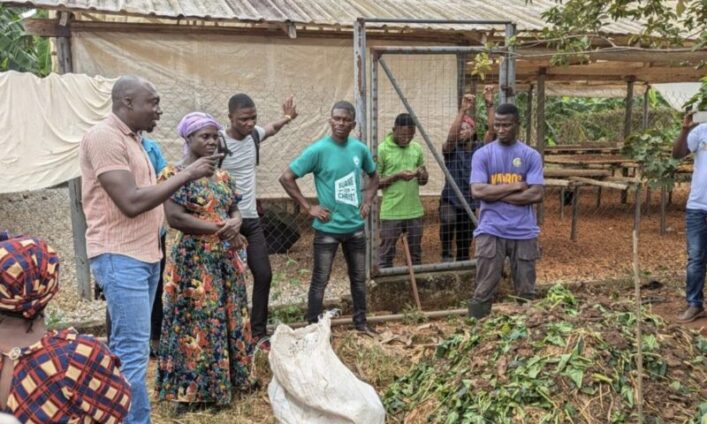The Peasant Farmers Association of Ghana, in collaboration with the Council for Scientific and Industrial Research-Crops Research Institute (CSIR-CRI), has organised a two-day practical workshop on agroecology and circular economy innovations, aimed towards promoting sustainable agriculture.
Participants, made up of farmer association leaders, agriculture extension officers, NGOs, and civil society organisations drawn from the Ashanti Region gathered at Offinso to receive hands-on training in simple composting techniques, aimed at reducing chemical fertilizer use and minimising agriculture-related biomass burning, which are key contributors to black carbon emissions, a potent short-lived climate pollutant.
Participants also learned to create nutrient-rich compost from organic waste, which enhances soil health while lowering costs.
Again, they were introduced to the preparation of different types of liquid fertilizers using fresh fish and cow milk, combined with water, molasses, and decanted rice soaking water.
This eco-friendly approach empowers farmers to utilize local resources effectively, reducing over-dependence on chemical fertilizers.
The training was part of the Agroecology and Circular Economy for Ecosystem Services (ACE4ES) project, which aimed at promoting sustainable agriculture practices to mitigate short-lived climate pollutants and enhance ecosystem services.
Dr. Kwaku Onwona-Hwesofour Asante, ACE4ES Project Lead, elaborating on the principles of agroecology and the circular economy, said the technology-enhanced food security and reduced agricultural greenhouse gas emissions.
The focus of the discussions was the reduction of methane and nitrous oxide emissions in rice cultivation.
Dr. Asante highlighted innovative practices such as the System of Rice Intensification and Alternate Wetting and Drying techniques, which could significantly decrease emissions while improving rice yields.
He said the workshop presented an opportunity to equip farmers with the knowledge and tools necessary for adopting sustainable agricultural practices, adding that through collaboration and innovation, “we can enhance livelihoods and contribute to combating climate change.”
The ACE4ES project, he stated, remained committed to fostering innovation across Ghana’s agricultural sector to pave the way for a greener and more resilient future.
Mr. Douglas Annor, Ashanti Regional Focal Person for the Peasant Farmers Association of Ghana, acknowledged the assistance from the Climate and Clean Air Coalition in supporting the ACE4ES project.
He said the collaboration would empower farmers with the tools and knowledge to adopt sustainable practices that benefit both livelihoods and the environment.
Latest Stories
-
AT Ghana gets Canadian investor, Rektron Group
3 minutes -
Mahama to set up inter-ministerial committee to implement economic dialogue recommendations
17 minutes -
Photos: Nurses and midwives’ strike leaves some hospitals empty
31 minutes -
Chief Imam calls for peace in Bawku
47 minutes -
GCB Bank pays courtesy visit to National Chief Imam ahead of Eid al-Adha
49 minutes -
Luv FM High School debate 2025 launched
53 minutes -
Researchers explore water access challenges among Kumasi’s urban poor amid climate change
55 minutes -
GES appoints Daniel Fenyi as Head of Public Relations
58 minutes -
I pray a future NPP gov’t will end politically-motivated justice
1 hour -
Fix the root, not the symptoms – ASEC condemns GH¢1 fuel levy
1 hour -
GH₵1 fuel levy is ‘regressive’ – Green Tax Youth Africa
1 hour -
NLC declares midwives and nurses’ strike illegal, orders them to call it off
2 hours -
Police intercept GH¢1m cash hidden in fertiliser bags at Juapong
2 hours -
Man found dead in Susan River in Oforikrom after downpour
2 hours -
Bosome Freho: Police allege some teachers are secretly fueling drug abuse in schools
2 hours

